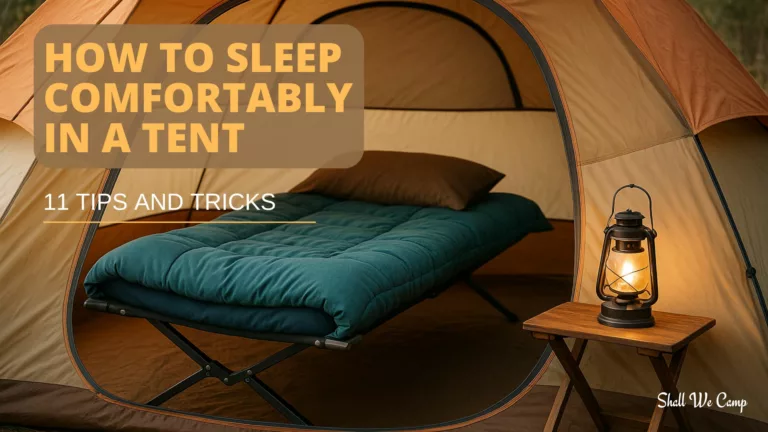There’s nothing quite like crawling into your tent after a day of hiking, exploring, or just soaking up the peaceful sounds of nature. But let’s be honest, sleeping in a tent doesn’t always mean sleeping well. Between the uneven ground, chilly temps, and that one rogue tree root under your back, a restful night can feel out of reach.
Getting quality sleep in a tent is a total game-changer for your entire camping experience.
The good news is with a few simple adjustments and the right gear, you can sleep just as soundly outdoors as you do at home. Below, I’m sharing 11 tried-and-true tips that have helped us get better sleep on our camping trips, whether we're out in the woods for a weekend or parked under the stars for a longer adventure.
Affiliate Disclaimer: This site contains affiliate links, which means I may earn a commission on purchases made through these links at no extra cost to you.
Table of Contents
1. Scout the Perfect Spot
Comfort starts with location. When you’re picking a place to set up your tent, aim for flat, level ground that’s free of rocks, roots, and pinecones. Even small lumps under your sleeping pad can mess with your rest. If possible, choose a spot that’s slightly elevated to avoid pooling water in case of rain. We also like to do a quick “roll test” with a water bottle. If it stays put, you're good to go.
Bonus Tip: Avoid setting up under a tree with lots of sap or overhanging branches that might creak in the wind all night long.
2. Invest in the Right Sleeping Pad
A quality sleeping pad makes all the difference. It provides both cushioning and insulation from the cold ground. If we’re car camping, we don’t mind bringing a thicker foam pad or an air mattress for extra comfort. But for backpacking trips, we usually choose a lightweight inflatable pad with a decent R-value for warmth.
Side sleeper? Look for a pad with a little extra depth to support your hips and shoulders.
3. Bring a Cozy Pillow
Don’t settle for wadding up a sweatshirt under your head (unless you have to!). These days, there are plenty of great camping pillows that pack small and still give you that “ahhh” feeling when you lie down. Some are inflatable with a soft cover, while others are compressible foam. We have found that both can work great depending on how much space you’ve got.
Our trick: If you’re short on space, stuff a dry bag with extra clothes and wrap it in a t-shirt for a DIY pillow that’s surprisingly comfy.
4. Wear Clean, Dry Sleepwear
Changing into clean, dry clothes before bed can make a huge difference in how warm and comfortable you feel. Even if it wasn’t a sweaty day, your daytime clothes might be holding moisture that’ll chill you once the sun goes down. We like to keep a set of dedicated sleepwear; something soft and cozy, like a lightweight base layer or fleece jammies depending on the weather.
Pro Tip: Merino wool or moisture-wicking synthetics work great for staying warm without overheating.
5. Establish a Bedtime Routine
Just like at home, a little nighttime routine can help your body wind down. Maybe it’s brushing your teeth, sipping a cup of herbal tea, or reading by headlamp for a few minutes. The familiar rhythm tells your brain it’s time to rest even if you're tucked inside a tent instead of your usual bed.
Try this: Dim the lantern or switch to red light mode as the sun sets to help your body ease into sleep mode.
📌Want to make your nighttime setup even better?
Check out Camping Lights for Night Cooking to find the best lighting options for winding down at camp.
6. Block Out Light and Noise
Nature is beautiful but it’s not always quiet or dark when you need it to be. Early sunrises, rustling leaves, distant campers, and nearby wildlife can make it hard to fall (or stay) asleep. That’s why we always pack an eye mask and a pair of earplugs. You can also play gentle white noise or nature sounds from your phone if that helps you relax.
Light sleeper? A buff or soft beanie can double as an eye mask in a pinch.
7. Keep Hydrated
You want to stay hydrated during the day, but nobody wants to crawl out of the tent in the middle of the night to find the bathroom (or the nearest bush). So you need to try to taper off your water intake about an hour before bed. This reduces late-night wakeups while still keeping you well-hydrated overall.
Camping in cold temps? Dehydration can sneak up on you so sip steadily throughout the day.
8. Keep Essentials Within Reach
It’s no fun fumbling around your tent in the dark for a headlamp, jacket, or water bottle. We like to keep those must-have items stashed right next to our sleeping area. A small gear pocket or hanging organizer inside the tent is perfect for this. You’ll sleep more peacefully knowing everything you need is close by.
Our must-haves: headlamp, water bottle, lip balm, socks, and sandals or camp shoes.
✅ Ready to Upgrade Your Sleep Setup?
If you’re looking to invest in new gear, we’ve put together a few of our favorite picks for sleeping pads, pillows, and cold-weather comfort. These are the same items we use and love and are perfect for your next outdoor adventure.
9. Warm Up Before Bed
Climbing into your sleeping bag cold can leave you chilled for hours. Instead, do a few jumping jacks, walk around camp, or do some light stretches before you zip up for the night. Getting your blood flowing warms up your core and helps your sleeping bag work more effectively.
Extra chilly? Try a warm drink and some hand warmers in your pockets before bed.
10. Use a Hot Water Bottle
One of our favorite cold-weather hacks: Fill a heat-safe water bottle with hot water and stick it at the foot of your sleeping bag. It’ll act like a mini space heater for your toes and help you warm up faster once you settle in. Just make sure the bottle seals tightly so you don’t wake up to a soggy mess!
Safety tip: Don’t use boiling water. Hot but not scalding is the way to go.
11. Ventilate Your Tent
It might seem counterintuitive, but cracking a vent or window, even in cool weather, can make a big difference. Tents trap moisture from your breath and body heat, which leads to condensation (and sometimes wet sleeping bags). A little airflow helps regulate the temperature and keeps things drier and more comfortable overnight.
Try this: Open vents at opposite ends of your tent to create cross-breeze ventilation.





